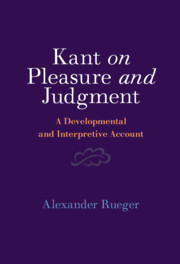Book contents
- Kant on Pleasure and Judgment
- Kant on Pleasure and Judgment
- Copyright page
- Contents
- Acknowledgments
- Abbreviations
- Introduction
- 1 The Early Reception of the Third Critique
- 2 The Completion of the System of the Powers of the Mind, 1770–1790
- 3 Kant’s Theory of the Feeling of Pleasure and Displeasure (I)
- 4 Kant’s Theory of the Feeling of Pleasure and Displeasure (II)
- 5 Consequences of the Theory
- 6 The Principle(s) of the Power of Judgment
- 7 The Interest of the Reflecting Power of Judgment and the Deduction of Judgments of Taste
- 8 The Imagination in Its Freedom
- 9 The Transition from Nature to Freedom
- Conclusion
- Bibliography
- Index
7 - The Interest of the Reflecting Power of Judgment and the Deduction of Judgments of Taste
Published online by Cambridge University Press: 19 April 2024
- Kant on Pleasure and Judgment
- Kant on Pleasure and Judgment
- Copyright page
- Contents
- Acknowledgments
- Abbreviations
- Introduction
- 1 The Early Reception of the Third Critique
- 2 The Completion of the System of the Powers of the Mind, 1770–1790
- 3 Kant’s Theory of the Feeling of Pleasure and Displeasure (I)
- 4 Kant’s Theory of the Feeling of Pleasure and Displeasure (II)
- 5 Consequences of the Theory
- 6 The Principle(s) of the Power of Judgment
- 7 The Interest of the Reflecting Power of Judgment and the Deduction of Judgments of Taste
- 8 The Imagination in Its Freedom
- 9 The Transition from Nature to Freedom
- Conclusion
- Bibliography
- Index
Summary
Satisfaction of the a priori principle(s) of the faculty of judgment by a representation is the means for achieving the faculty’s interest. In concept application and formation, this interest is the harmony of imagination and understanding. Since the application of available concepts is not accompanied by pleasure, such ‘unfree harmony’ must be distinguished from the ‘free harmony’ in concept formation and taste. The imagination apprehends a manifold and is here free because it is not guided by a concept; in concept formation, however, it is still bound to the empirically given manifold, while in taste it is ‘productively free’, it invents its own forms. When such freely invented forms agree with the given forms of conceptualized objects, we register this in the pleasure of taste. This revised view of the ‘free play’ of the faculties leads to a novel interpretation both of the ‘deduction of judgments of taste’, and of the relation of the two versions of the principle of judgment.
Keywords
- Type
- Chapter
- Information
- Kant on Pleasure and JudgmentA Developmental and Interpretive Account, pp. 125 - 158Publisher: Cambridge University PressPrint publication year: 2024



